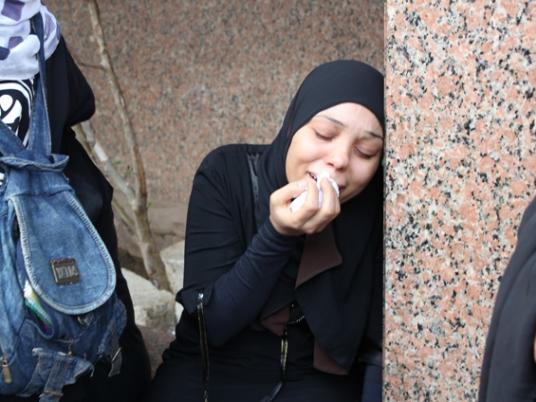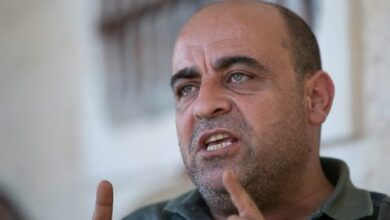
Ineam Atta knew her 23-year-old son, Essam, was being tortured in Tora prison. He rang home on Wednesday evening to let his mother and family know that an officer called Nour was giving him trouble.
His father, Ali, told him to try and withstand it, so that the situation – their court appeals against him being tried as a civilian by a military court – doesn’t become any worse than it already was, his father said. Essam had been in prison for eight months by then.
On Wednesday evening, Essam also asked his sister Iman for a sim card, so that he could keep in touch using a mobile phone. The attempt to smuggle this into his cell the next day was apparently caught by Nour, who said that he would teach Essam a lesson.
“I tried to call his mobile at around 7pm on Thursday, and his friend picked up,” Iman told Al-Masry Al-Youm. It was then that she found out that after a two-hour attempt to get his cell door opened, her brother’s body was found laying nearly dead.
“He was taken from us with the blink of an eye, without a reason,” Iman said.
The police officer taught his lesson by inserting hoses into Essam’s mouth and anus, which led to bleeding and subsequently his death, his friends and family say.
He was also made to drink water that was intoxicated with a chemical substance, Iman, his sister, said.
Iman spoke to Al-Masry Al-Youm on Friday outside Zainhom, where the official autopsy report was being waited for by around 200 supporters, including members of the No Military Trials of Civilians group, the Al-Nadeem Center for Rehabilitation of Victims of Torture and the April 6 Youth Movement Democratic Front.
His mother, Neima, was in shock and wailing constantly as were his two sisters. His father tried to go into the area where the autopsy was being conducted, but would not be admitted.
His supporters’ version of events is, however, contested by the police. They say there was no evidence of torture on his body, and he died from taking drugs, Malek Adly, a lawyer from the Hisham Mubarak Law Center who is working on the case, told Al-Masry Al-Youm. They also tried to say he chemically intoxicated himself and that is what caused his heart to stop.
But Adly also took a testimony from the doctor who admitted Essam at the poison unit of the Manyal center of Qasr al-Aini hospital, who suspected foul play and said his face had severe injuries with liquid secretions from the mouth.
According to Sayed Fathi, another lawyer working on the case from the Al-Hilal Association for Freedom, “Essam arrived at Maniyal still clinically alive, but in a very bad shape. The doctors tried to rehabilitate him, but he died only a few minutes after arriving. He was on his last breath.”
An autopsy was conducted on Friday on Atta's intestines and a small rolled package with pills in it was found and taken for testing.
“It is unclear yet how the pills got into his body, but either way, they could not have caused his death. This is very much like the Khaled Saeed case when they found a rolled package with weed in his body. And given what I know about the history of these cases it is a technique the police often use to get themselves acquitted," Fathi told Al-Masry Al-Youm.
Saeed, a young Alexandrian man, was tortured to death by two policemen in July 2010, in unclear circumstances. The two policemen were sentenced to seven years imprisonment each last week.
“There was no evidence of torture on his body. His face was swollen, it had a bluish colour and blood was coming out of his mouth suggesting that there was something internally wrong. The story of the water hose came from his friends who were at the prison, and they called his family to alert them of his death,” Fathi added.
Fathi and others are waiting for the test results of the package found in Atta's intestines. “This case is very similar to Khaled Saeed, in which the initial forensic report was a cover up for what really happened.”
Atta was arrested and given a two-year prison sentence by military police in Moqattam on 25 February, simply for being a bystander as a fight broke out, his sister told Al-Masry Al-Youm. The official version, however, is that he was occupying an apartment illegally with his friends.
“Even if he was a thug or a criminal, he doesn’t deserve to die, and in this way,” a member of the April 6 Youth Movement said.
Before being imprisoned, he worked with his father in a small shop making leather shoes.
There are 12,000 civilians being tried by military courts, according to human rights watchdogs' reports.
*Correction: This article originally stated that Essam Ali Atta died in prison. It was amended on 30 October to indicate that he died on arriving at hospital.




